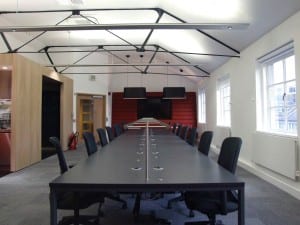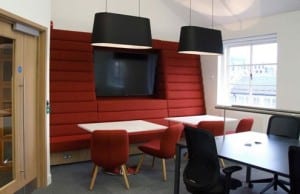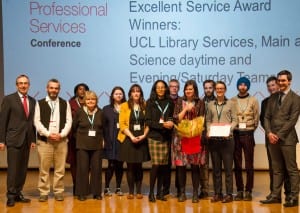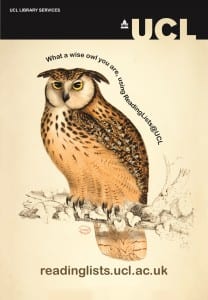Special Collections News
By Debs M Furness, on 8 February 2016
The Special Collections Team has been busy since the last newsletter, teaching or supporting over 30 undergraduate and graduate classes, running Connected Curriculum projects with BASc, Geography, History and Scandinavian Studies students, and working with our conservators to prepare student-led exhibitions on the history of paper and books for the new Senate House Hub, for which UCL student volunteers have worked alongside conservation interns from Camberwell College of the Arts. Preparations for future events include contributions to exhibitions at the Wellcome Collection and the Globe Theatre, an anniversary exhibition on the Spanish Civil War held in Spain, and our own exhibitions and events programme listed below.
Recent cataloguing activities have taken in mathematical works from the Graves Collection including an engineering treatise from 1775 offering advice on fortifying rivers, which might perhaps have been of use as floods hit the UK this January; a copy of the catalogue from the international Great Exhibition held in Hyde Park in 1851 (STRONG ROOM TEMP 2016/1-3); and a file of correspondence from 1959 between leading writers of the day on a petition to The Times urging the publication of Lolita in uncensored form (from the recently catalogued Wollheim Papers). You can read elsewhere in this newsletter about progress on our Jewish Pamphlets project.
 This term also saw secondary-school pupils working with a professional author through the charity First Story to write short stories and poetry inspired by our collections. Participants handled a goatskin to understand the parchment of medieval manuscripts, and saw some of the very first Western printed books from UCL’s large incunabula collection. The results included some outstanding writing, including one piece written from the perspective of a medieval book in which the book appreciated being made of parchment because the slight furriness of the animal skin had kept the book warm during its many centuries living in cold libraries. Another piece offered a slick sales pitch, as if from an Early Modern printer, trying to persuade readers to favour the new technology of printing and brand-new portable format of the Early Modern octavo book over the non-portable medieval manuscript, five years in the making, highly expensive, and requiring an arduous journey to a chained library to be read. Feedback from the pupils included comments such as ‘I didn’t realise the significance, importance and value of books, I used to feel like when people said ‘what’s the big deal about books’ I understood why that could be seen as rude, but I didn’t understand how much until today’, indicating how important such sessions are for the school-aged generation to value our historic book collections in the future.
This term also saw secondary-school pupils working with a professional author through the charity First Story to write short stories and poetry inspired by our collections. Participants handled a goatskin to understand the parchment of medieval manuscripts, and saw some of the very first Western printed books from UCL’s large incunabula collection. The results included some outstanding writing, including one piece written from the perspective of a medieval book in which the book appreciated being made of parchment because the slight furriness of the animal skin had kept the book warm during its many centuries living in cold libraries. Another piece offered a slick sales pitch, as if from an Early Modern printer, trying to persuade readers to favour the new technology of printing and brand-new portable format of the Early Modern octavo book over the non-portable medieval manuscript, five years in the making, highly expensive, and requiring an arduous journey to a chained library to be read. Feedback from the pupils included comments such as ‘I didn’t realise the significance, importance and value of books, I used to feel like when people said ‘what’s the big deal about books’ I understood why that could be seen as rude, but I didn’t understand how much until today’, indicating how important such sessions are for the school-aged generation to value our historic book collections in the future.
To see some of our collections up close, try the exhibitions and events below.
UCL Special Collections Calendar
Events
From Devilry to Divinity: Readings in the Divina Commedia
Tuesdays 23 February, 1 and 8 March, 1-2pm, The Warburg Institute, Woburn Square, WC1H 0AB
– There is still time to catch readings and talks on Paradise from Dante’s Divine Comedy, given by John Took (UCL Professor of Dante Studies), Alessandro Scafi (Warburg Institute Lecturer in Medieval and Renaissance Cultural History) and Tabitha Tuckett (UCL Rare-Books Librarian) to complement exploration of UCL Special Collections’ outstanding Dante Collection.
How Dante’s Divine Comedy came into print
Wednesday 9 March, 6-7.30pm, Malet Place, UCL, WC1E 7JG (venue to be confirmed)
– Tabitha Tuckett (UCL Rare-Books Librarian) and Andrea del Corno (The London Library) will use incunabula from UCL’s Dante Collection, and discussion of the first printed edition of the Divina Commedia held in the British Library, to illustrate the political, regional and national factors that caused Dante’s medieval masterpiece of Italian poetry to survive in Italy in the late 1400s through the innovative technology of printing. For more details, email marta.niccolai@ucl.ac.uk
The Life of Moses Gaster in 10 Objects
Tuesday 22 March, 1-2pm, Room 417, DMS Watson Science Library, Malet Place, UCL, WC1E 7JG
– Vanessa Freedman (UCL Hebrew & Jewish Studies Librarian) and Gabriel Pogrund (UCL Geography student) will use 10 objects from the Gaster Archive to illustrate the life of the remarkable Rabbi Dr Moses Gaster (1856-1939), rabbi, Zionist leader and polymath and a key figure in the Anglo-Jewish community of the late 19th and early 20th century. To reserve a free place, email t.tuckett@ucl.ac.uk.
Exhibitions
Dangerous diaries: exploring risks and rewards in fabrication
A range of rare material, from medieval manuscripts to radio-active lab notes
Octagon Gallery, UCL Gower Street, London, until mid-February 2016
Uncovering UCL’s Jewish Pamphlets collections
Five exhibits from recently catalogued material, including a micrographic illustration of Jerusalem
Main Library, UCL Gower Street, London, until 29 February 2016
750 years of Dante
A small selection of illustrated editions from UCL’s outstanding collection of rare editions of Dante’s Divine Comedy as part of the 750th anniversary of Dante’s birth
Main Library, UCL Gower Street, London, 3 March-15 September 2016
Fair play and foul: connecting with Shakespeare at UCL
Dictionaries, forgeries and school aids marking the Shakespeare400 anniversary of 2016.
Main Library, UCL Gower Street, London, until 15 December 2016
Medical Treasures
Examples of the range of Special Collections’ medical material, from the first illustration of a leg amputation through Vesalius’ ground-breaking Renaissance anatomy textbook to more recent cartoons
UCL Cruciform Hub, Gower Street, London. Permanent.
What is paper? What is a book? What is the difference between a physical and an e-book? Student projects on the history of the book.
Research-based projects put together by students volunteering with UCL Special Collections, illustrating their tools, techniques, and thoughts on using rare books and archives alongside digitised and e books.
UCL Senate House Hub, 3rd floor Senate House, Malet Street, London, from 29 February 2016 (access to UCL staff and students only)
Dr. Tabitha Tuckett, Rare-Books Librarian
——–
 Close
Close






 On February 1st the new Research Grid opened its doors to graduates. Already proving to be hugely popular, the new learning space on the 4th floor of the Science Library provides graduates with state of the art study facilities for collaborative research and project work, and areas for more private study.
On February 1st the new Research Grid opened its doors to graduates. Already proving to be hugely popular, the new learning space on the 4th floor of the Science Library provides graduates with state of the art study facilities for collaborative research and project work, and areas for more private study. Prof David Bogle Pro-Vice-Provost of the Doctoral School said:-
Prof David Bogle Pro-Vice-Provost of the Doctoral School said:- From February 2016, construction of the
From February 2016, construction of the 
 We are delighted to announce that Phase 2 of the
We are delighted to announce that Phase 2 of the  While cataloguing the pamphlets in the first phase of the project we came across many fascinating items, such as:
While cataloguing the pamphlets in the first phase of the project we came across many fascinating items, such as: UCL Library Services is improving support for researchers in a number of areas of the research lifecycle, in line with the goals of our Library Strategy (2015-18). One of these areas is support for bibliometrics and we are delighted to announce the launch of our new
UCL Library Services is improving support for researchers in a number of areas of the research lifecycle, in line with the goals of our Library Strategy (2015-18). One of these areas is support for bibliometrics and we are delighted to announce the launch of our new  Last Summer, the number of UCL libraries offering Self-service issue and return facilities using Radio-Frequency technology expanded to include:
Last Summer, the number of UCL libraries offering Self-service issue and return facilities using Radio-Frequency technology expanded to include: Staff at
Staff at 
